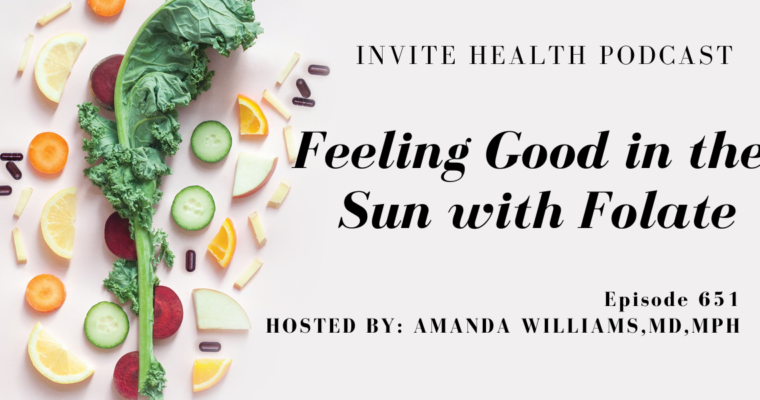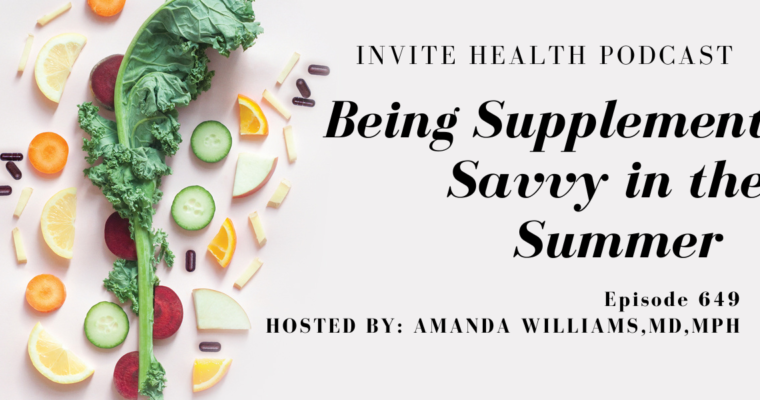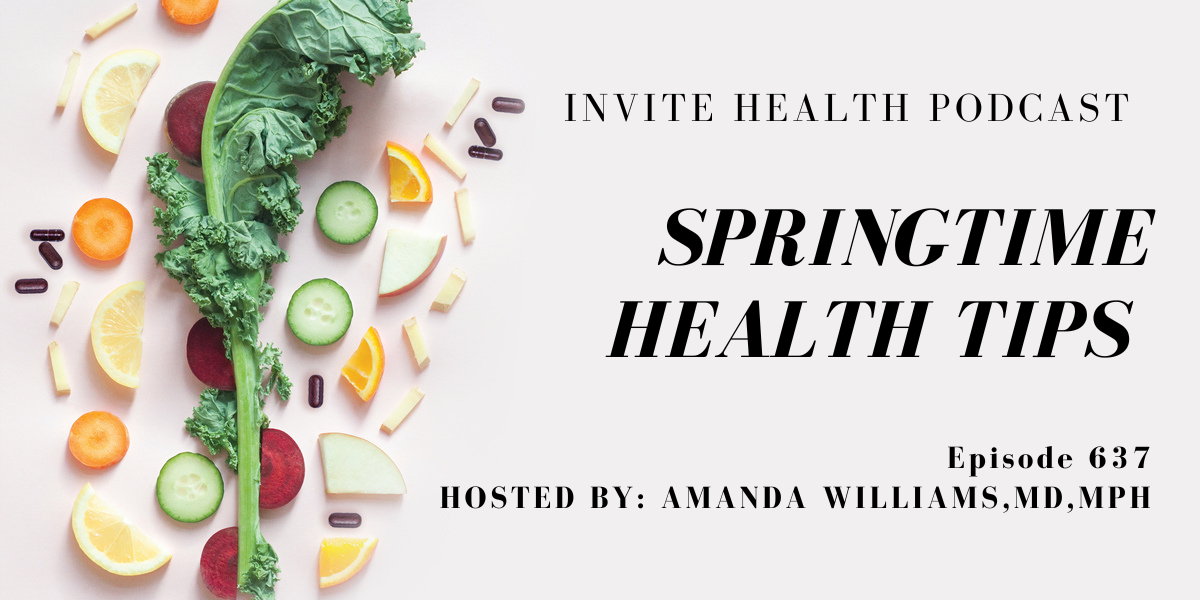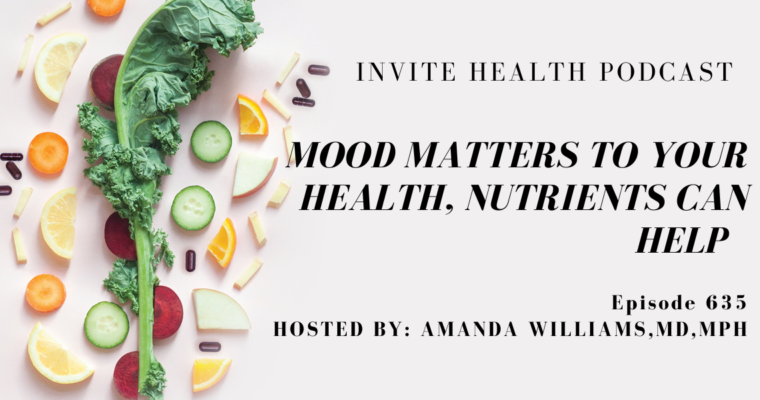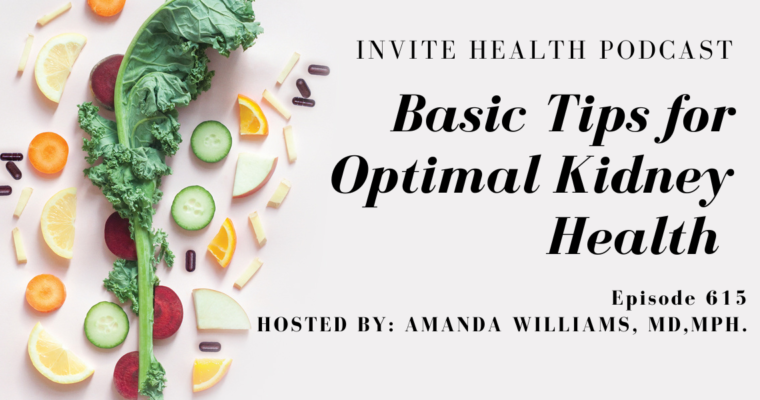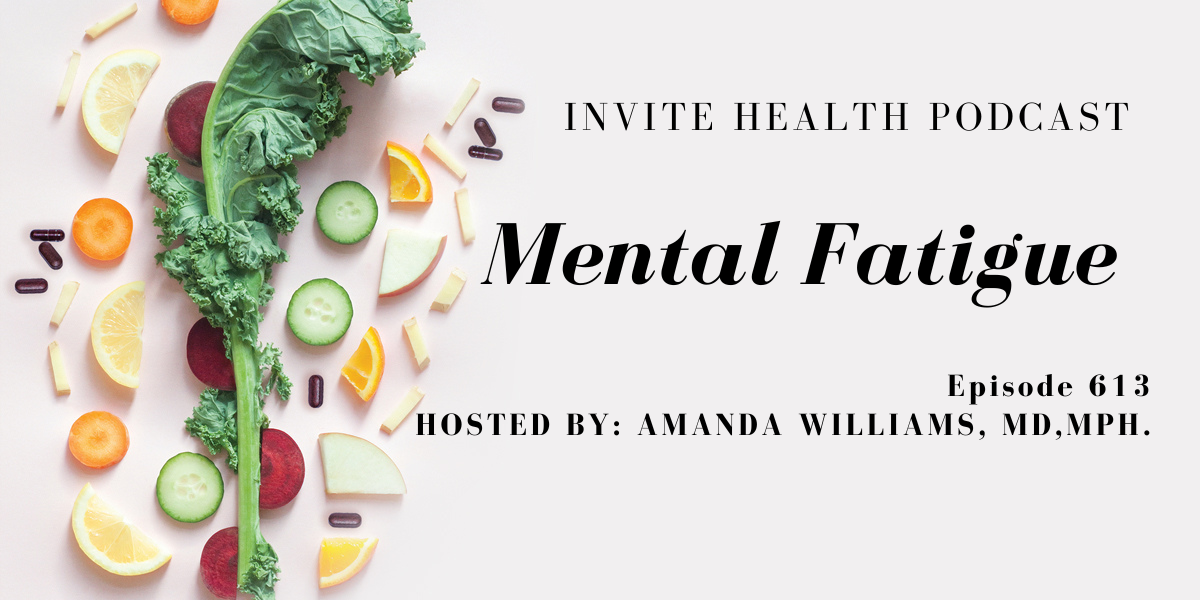Subscribe Today!
Please see below for a complete transcript of this episode.
SPRINGTIME HEALTH TIPS, INVITEⓇ HEALTH PODCAST, EPISODE 637
Hosted by Amanda Williams, MD, MPH

*Intro Music*
InViteⓇ Health Podcast Intro: [00:00:04] Welcome to the InViteⓇ Health Podcast, where our degreed health care professionals are excited to offer you the most important health and wellness information you need to make informed choices about your health. You can learn more about the products discussed in each of these episodes and all that Invite Health has to offer at www.invitehealth.com/podcast. First time customers can use promo code podcast at checkout for an additional 15% off your first purchase. Let’s get started. † [00:00:34]
*Intro Music*
Amanda Williams MD, MPH: [00:00:40] Springtime is here, which means we need to make a few adjustments to our daily supplementation routine. I always say that springtime comes with warmer weather, longer daylight hours, and of course, people think about spring cleaning. This is a good thing. But we should also think about cleaning of the body. We don’t want to do a crash detox of course, but what. Should we be thinking of as we step into this new season? I’m going to talk about that today. I am Dr. Amanda Williams, scientific director at Invite Health and with every new season, I always say this is the time that you should be cognizant about how we should best nourish our body. And with every changing season, I always find it to be incredibly advantageous to look at detoxifying, and we know that every single day our body goes through different phases of detoxification that is heavily reliant on vitamins, minerals and antioxidants. And this is why taking a daily complete multivitamin, multimineral is so critical every single day throughout the year. But when we think about the change of the seasons, we should also think about what does this new season mean for me? How does the new season affect my physical well-being? We know in the winter we want to incorporate in more healthy fats. We want to incorporate in vitamin D in a higher amount. But as we get into the warmer seasons, what should we be zeroing in on? We want to think about energy, we’re going to be outdoors, perhaps more, so we want to think about the methylated B vitamins, but we also want to think about how we can facilitate a better means for our body to help self-detoxify. So, we can look at formulations such as the Colon Hx, which we know is a powerful blend of bentonite clay and psyllium fiber. And psyllium fiber is wonderful because it works really lovely with your gut microbiome to help to enhance the release of butyric acid. And that is really important because butyrate is a wonderful way for us to regulate inflammation. We don’t want to step into a new season being inflamed and coming out of winter, it’s always advantageous to do a cleansing of sorts. And so, with the Colon Hx, I find this to be a wonderful thing to add into your daily supplementation routine. Take one scoop generally in the evening and you can do this for ten days, 14 days is usually sufficient, there’s no problem if you take it long term. But if we’re looking at already having a fairly healthy lifestyle, doing the right things each day in terms of our diet, then of course we would want to think about how can we enhance this? And this is where that Colon Hx can really be incredibly supportive. The power of psyllium fiber is quite unique because of the fact that it can make that butyrate. And then when you partner that with something like bentonite clay, which has been used medicinally for hundreds of years for all of its powers, for binding under heavy metals and helping the body remove nasty toxins and chemicals that we’re exposed to, it’s a really good seasonal supplement to consider into your routine. † [00:04:03]
[00:04:04] I had mentioned the methylated B vitamins. The reason why is because we know that as we get into the warmer months that folate in particular has a tendency to be degraded due to UV exposure so from the sun. So, we want to make sure that we maintain healthy folate levels during those warmer months. So, incorporating in one capsule of Methyl B because you’re gonna get that methylated folate. So, it’s a high absorption bioactive form of folic acid, which is. wonderful for immune health, for mood health, for digestive health, for cardiovascular health, you name it, as well as, for liver health. So, to support once again healthy detoxification and having the methyl B allows for our natural Sam-E, to work much more efficiently when it comes to allowing the body to properly neutralize toxins and get rid of them, eliminate them right out of our system. So, these are two different nutrients that we can turn to during the spring. But we also want to think about having more energy. So, incorporating in a formulation such as Energy Hx during the springtime, an excellent choice. The Energy Hx contains Ubiquinol, which is a registered trademark form of that Ubiquinol, it’s called Kaneka and it also is partnered with ginseng extract. So, the two of these nutrients come together and work to drive cellular energy. So, we know that the days are a little longer, maybe you’re more active and we want to make sure that we maintain our energy production throughout the day. So, incorporating in Energy Hx, an excellent choice. But let’s go back and think about all of the crud that we build up throughout the days, and especially as we shift from one season to the next, we can look at a product such as the Greens Hx. † [00:05:56]
TOXIC TOXINS: YOU HAVE TO DETOXIFY ALL CHEMICALS- INVITEⓇ HEALTH PODCAST, EPISODE 586>>LISTEN NOW!
[00:05:57] The Greens Hx, which contains over 40 different fruit and vegetable extracts, so we’re getting all the vitamins and the minerals and the antioxidants that are naturally occurring from those fruits and vegetables, and that is combined with these powerful little algaes, chorella, and spirulina, which do a wonderful job in terms of cellular detoxification. So maybe you’re carrying around a little extra sludge from the winter. We want to make sure that the body can help itself remove that. And with the power of the Greens Hx, this really sets you up to have a much more efficient way to have the body detoxify. And this is always key. Detoxification is something that we shouldn’t look at as just a snapshot in time like, “Oh, I’m going to detox by just for two days.” Those crash detoxes are not necessarily sustainable. At the end of the day, what we end up creating is a kind of a rebound effect because as we are stripping our body of essential vitamins and minerals and antioxidants, the body can struggle to kind of come back to normal levels of those because we removed those. So that’s why the crash detoxes, generally speaking, are not that beneficial for you. So, we want to do everyday support of our body. So first and foremost, it comes from the foods. We have to always go back to that concept of letting food be thy medicine. So, if we’re having high antioxidant rich foods coming from fruits and vegetables, those powerful carotenoid, rich green leafy vegetables, for example, in the springtime is a perfect time to really start to freshen up your different recipes that you’re making every day, the foods that you are eating every day, because the access to those fresh fruits and vegetables become more pronounced during this time of the year. So, we always want to make those healthier choices when it comes to the foods that we’re eating and even the things that we’re snacking on. So instead of having potato chips, maybe have a handful of nuts, for example. If you’re making a lovely salad, for example, maybe put some sunflower seeds or pumpkin seeds on that to help to increase the healthy fat exposure, get some good fiber. These are all things that help the body with detoxification and create balance across all systems. † [00:08:24]
[00:08:25] So when we go from season to season, we want to look at dietary shifts, what do we have maybe more access to during a particular season? How do we incorporate those healthy foods into our daily routine? And then, of course, what nutrients would be advantageous based off of a seasonal shift? So, Colon Hx definitely from season to season, we always want to incorporate this one in and as I mentioned, maybe ten days, 14 days of utilizing this formulation, excellent choice. Has that bentonite clay and the psyllium fiber. And then we want to look at the daily support of detoxification with Greens Hx because we know the power of that greens, which also has a probiotic blend in that I should mention, because that’s great for your immune system and that gut-brain connection and the gut-liver connection. So having the Greens Hx, very good choice there. One scoop a day, you can get very creative with the Greens Hx as to how you want to use this. You can make smoothies with it; you can drink it straight up just with water. It’s kind of your choice. And then certainly we have to think about the impact that UV light has on folate, so, during the spring and summer time, want to make sure that we’re getting greater amounts of folate via supplementation, so that’s where your methyl B comes into play. But remember you get that rebound benefit of taking methyl B for the support of your mood, for your energy, for your detoxification overall, those B vitamins incredibly critical to so many different functions in the human body. So, the methyl B formulation. Then of course, we want to have that energy, so we can look at the Energy Hx that partnering of Ubiquinol, CoQ10 and ginseng extract. So, if you follow this routine throughout the springtime, you should have that energy, feel better. Feel as though your body has had that wonderful spring cleaning and you will be off to the races. So that is all that I have for you for today, and I want to thank you so much for tuning into the InViteⓇ Health Podcast. Remember, you can find all of our episodes for free wherever you listen to podcast, or by visiting, invitehealth.com/podcast. Do make sure that you subscribe, and you leave us a review. You can follow us on Facebook, Twitter and Instagram. And we will see you next time for another episode of the InViteⓇ Health Podcast.† [00:08:25]
ICYMI:NEW YEAR DETOX TIPS, INVITE HEALTH PODCAST, EPISODE 611>>LISTEN NOW!
*Exit Music*


